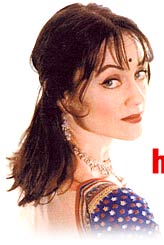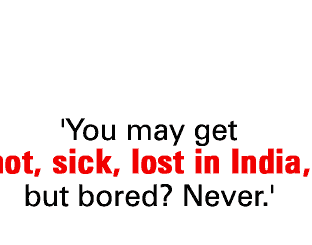

Maura Moynihan is a journalist, painter, musician, and activist for exiled Tibetans.
Moynihan, who fell in love with India more than 30 years ago, is the author of the recently published Yoga Hotel, a collection of short stories and novella that sprang from her Indian encounters.
The book, published by a division of Harper Collins, has been getting a lot of attention. The New York Times recently praised it for its vivid setting and interesting characters.
Daughter of the late Senator Daniel Patrick Moynihan, US ambassador to India between 1973 and 1975, she has also been running a fashion business for over a decade.
She says she was inspired by the sari and its grace, to transform luminous antique fabrics, embroidered with beads, brocade and finely spun gold and silver thread into blouses, dresses, pants and coats.
Maura, who recently moved back to New York, met Senior Editor Arthur J Pais at a coffee shop in mid-Manhattan where, while nursing a tall cup of soy milk, she talked about her karma of being an Indian.
Do you believe in reincarnation?
Absolutely. Otherwise, how can I explain how I fell in love with India and my incredible love and attachment for India? I was 13 when I visited India for the first time more than 30 years ago. When the plane started circling over Delhi, my heart was pounding. I felt I'd finally come home. Hard to explain in rational terms...
Have you wondered what you were in a previous birth?I don't want to.
Do you have an Indian name?Some time when people find it difficult to pronounce my name, I say I am Maya. In Braj, some people called me Madhu. I love that name too. I am very fond of Braj. I believe when I prayed and meditated there Krishna 'lifted the veil of Maya,' as they say.
It is difficult to explain, but for an instant I saw everything as illusion, then the insight vanished. The pandit at the ashram told me sometimes Krishna grants this insight to the devotees he favours.
You call yourself a Gandhian. Why?I believe in leading a simple and ethical life. I am not rich. I believe in sharing and helping people. I am also a vegetarian.
What kind of a vegetarian are you?See this milk I am drinking, it is soy milk. I avoid animal products. There's no justification for eating meat, is there?
How long have you been a vegetarian?Oh, I was born a vegetarian.
Born a vegetarian? An Irish girl like you?Of course, I was born a vegetarian but authority figures forced me to eat meat and fish. When I was about 15 we moved to India, so I was allowed to become a vegetarian, as there was ample proof that a brilliant civilisation endured for centuries without Big Macs.
You are also committed to vegetarianism. Do you get discouraged that someone you admire a lot, the Dalai Lama, is not a vegetarian?
No. As he explains in his autobiography, he became a committed vegetarian in his early years in exile but nearly died of hepatitis. His doctors told him he needed to eat meat to survive. There aren't many vegetables on the Tibetan plateau, where he was born.
What have you inherited most from your father?His deep passion for scholarship and social justice. He wrote 19 books. He felt writing was the highest art. I always wanted to be a writer. He was a great humanist. He used to say there was terrible poverty in India but in America, there was less terrible poverty but more terrible behaviour.
He also had an excellent sense of humour, isn't it?Oh yes. I remember when the US sold a building that belonged to the American embassy in New Delhi. But the bureaucrats in Washington were not happy with his decision. There were arguments and counter arguments. At one point, my father said: 'They have an edifice complex.'
He also gave interesting advice to young writers, didn't he?My father took writing very seriously and he wrote for many hours every morning. David Stockman, economic adviser in the Reagan administration, worked under my father. When he received a fabulous advance to write a book, he asked my father, 'How do you write a book?'
'In the morning,' my father said.
You laugh a lot.
I do and I think it is important to have a sense of humor and absurdity, especially in India. I remember, I was trying to get into the inner sanctum in Jagannath temple in Puri. They would not allow me despite pleadings because I was not a pure Hindu. I tried for three days. Then I suddenly saw the idol being carried out for immersion. I had my darshan but I could not see the same idol inside the temple (laughs).
What did you learn from that experience?India has its own logic. If you don't get it, you are missing the point, and certainly the humor. There are times women ask me why I am not married. When I tell them I was married once, and that I have a son, they find it difficult to believe. They cannot believe how I can be without a husband when I have a son.
You are a musician, stand-up comic, human rights activist, entrepreneur. Why didn't you start on this book earlier?
This has been in the making for over a decade. It was published in India in 1999 by Roli Books. I did a book tour in India and had a great time with it.
Why didn't you think of publishing the book in America first?Many people told me Americans won't be interested in reading a book like it. Last year I met Judith Regan [who runs a division of Harper Collins], left a copy with her, went to Nepal for the summer, came back and discovered she would publish it. That's kismet.
What do you want readers in America to take from the book?The universality of people, ambition, fear, desire and need. These drives intersect with the culture an individual finds himself, but we all feel them, don't we?
Do you belong to any religion?No, though I am drawn to Buddhism and Hinduism. I go to churches, mosques, gurdwaras and mandirs. There are times I meditate and on other occasions, I join prayer meetings. I suppose I am a true Indian. I belong to everyone.
Your father was a practicing Catholic. Was he disappointed because you embraced various religions?
Never. He used to tell me religion was meant to make one a better person, and if I believed a particular religion or several religions helped me, it was fine with him.
You are so passionate about India. What made you decide to settle down in New York? Why not India?
I lived in and out of India for 30 years. After 9/11, I feel a renewed passion for New York. It's a precious place, a great city, a worthy cause. I'm a New Yorker, and proud of it. There are so many desis here, I don't feel homesick. There's a bhangra party every week.
You have had several book readings. What is the most interesting question people have asked you?
Always, it's what it is that I like about India.
I can spend hours on that one. In sum, India has everything.
If you can't find it there, it doesn't exist. You may get hot, sick and lost in India, but bored? Never. Unless, you're one of those people who didn't have a good time in your past life.
Design: Uday Kuckian






 © 2025
© 2025